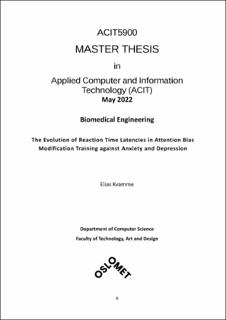The evolution of reaction time latencies in attention bias modification training against anxiety and depression
Master thesis
Published version
Permanent lenke
https://hdl.handle.net/11250/3017243Utgivelsesdato
2022Metadata
Vis full innførselSamlinger
Sammendrag
Depression disorder is one of the most prevalent mental illnesses in the world. Its societal and economic burden on the world society is huge, and therefore the need for good treatment methods is of great importance.
Attention Bias Modification training (ABM) is an interesting way of treating patients with depression and anxiety. Studies has shown that a bias against the negative is having a crucial role in both developing and keeping a depression disorder. Several researchers have proved that depressed patients tend to have a focus and attention against negative information. (Beck, 2008; Disner et al., 2011; Gotlib & Joormann, 2010; Peckham et al., 2010)
Using a dot-probe task, 321 patients have gone through ABM training over a 14-day period, with a total of 28 sessions. The scope in this thesis is to find key factors amongst the patients that can predict the effect of the training. The information provided for each patient was the age, gender, Brain-Derived Neurotrophic Factor (BDNF) allele and depression severity before and after the training period, using both the Hamilton scale and Beck’s Depression Inventory.
The findings that were made was that it was in particular two main factors that was the best predictor for if the training would have the desired effect or not. These two factors were the age of the patients as well as the severity of the depression. The younger participants tended to have a higher improvement rate than the older participants. This might be due to the decreased plasticity in the older participants brains. The analysis also indicates that the younger patients that had a positive effect of the training showed improvement already after the first week of training. This hypothesis would be interesting to pursue further.
The participants with more severe depression had a much higher rate of improving their illness. The median pre-training Hamilton score for the ones that improved was 10, while the non-improving participants had a median pre-training Hamilton score of 6.5.
